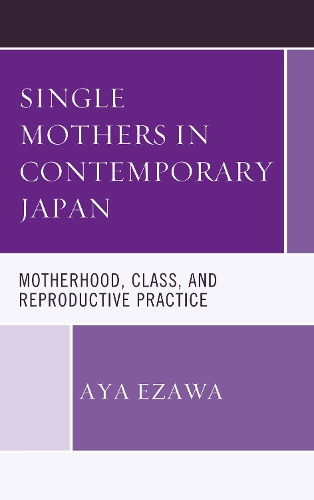
Single Mothers in Contemporary Japan: Motherhood, Class, and Reproductive Practice
(Hardback)
Available Formats
Publishing Details
Single Mothers in Contemporary Japan: Motherhood, Class, and Reproductive Practice
By (Author) Aya Ezawa
Bloomsbury Publishing PLC
Lexington Books
12th May 2016
United States
Classifications
Professional and Scholarly
Non Fiction
Asian history
Gender studies: women and girls
306.874320952
Physical Properties
Hardback
156
Width 162mm, Height 239mm, Spine 16mm
363g
Description
Combining work and family remains a major challenge for married women in contemporary Japan, and its not uncommon for them to quit working when starting a family. Single mothers, by contrast, almost always work, regardless of the age of their children. Despite their eagerness to support themselves and their children through employment, their average income remains low and many live on a household budget close to the poverty line. This book examines how the difficult living conditions facing single mothers in Japan highlight not only the challenges they face in earning a family wage and managing the work-family balance, but also reveals the class dimensions of family life in contemporary Japan. The need to make ends meet with few resources means that mothers may find it difficult to uphold the lifestyle they may consider as most appropriate for the upbringing of their children, and that they may have to choose between their presence at home, in line with the ideal of the middle-class housewife and mother, or devoting more time to earning an income that can pay for a good education. Social class, in this case, is not just a matter of education, occupation, or income, but is also expressed by mothers approaches to their childrens upbringing and future opportunities in education and employment. Based on life history interviews with single mothers, this study examines the gendered meanings of social class and social achievement and the role of maternal practices in shaping their childrens future life trajectories.
Reviews
The book offers a compassionate view of the cultural and financial pressures that these women face.... The book offers a chance to revisit the question of how, given the rapidly declining population and slowing birthrate, single motherhood might be an economically and socially sustainable alternative to the continually normalized male-breadwinner family. * Japanese Studies *
Aya Ezawa offers us not only a wonderfully detailed account of the experiences of single mothers in Japan but also a sophisticated examination of how gender and class intersect with Japans welfare, employment, and education systems in the case of women who appear to demonstrate a perhaps surprisingly conventional attitude towards marriage and family. -- Roger Goodman, University of Oxford
In this beautifully written book, Ezawa captures the lives, feelings, and identities of single mothers who raised children during the recent recession in Japan. By combining life history interviews and an engagement with sociological questions about class and gender, Ezawa powerfully demonstrates how marital status and maternal practices define single mothers class identity, which stands in clear contrast to the ideal of stay-at-home middle-class motherhood. This book provides a rare window on single mothers struggles for balancing work and family and strategies for their childrens future in contemporary Japan. -- Hiroshi Ishida, University of Tokyo
Based on over fifty in-depth interviews, this important work expertly analyzes the lives of single mothers in contemporary Japan in terms of gender, class, and generation. Battling to stay in full-time employment while providing a loving household for their children, these feisty women confront conservative social norms while gaining some support from an intermittently liberal welfare regime. Sympathetic but balanced, Ezawa provides the most nuanced account to date of Japanese single mothers. -- Tom Gill, Meiji Gakuin University
This book is a carefully researched and persuasively analyzed investigation of biographies and living conditions of Japanese single mothers in the late-1990s, a period of dramatic social and economic transformations in that country. In telling the stories of single mothers in Japan, Aya Ezawa offers insights into the structural disadvantages of being a woman and a single mother in Japan today, the ways in which new social and economic inequalities are being engendered, and how these women strive to ensure better futures for their children. This is an important read for anybody interested in women and family in Japan. -- Ito Peng, University of Toronto
One of the strengths of [Ezawa's] book is the empathy and close knowledge she conveys for her research subjects. * Pacific Affairs *
Author Bio
Aya Ezawa is lecturer at Leiden University.
